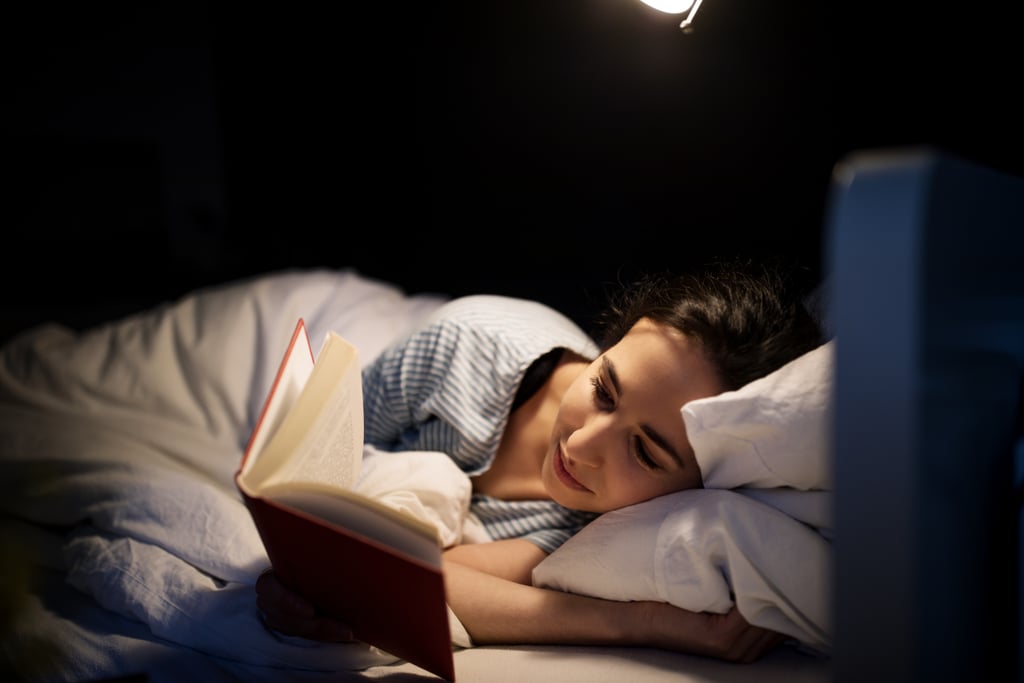Like most working professionals, I consider my alarm to be a necessary evil [1]. While I don't particularly look forward to being jolted out of a blissful slumber [2] to Apple's radar sound, I don't know any other way to ensure I'll get up in time for work. But many people — Oprah included [3] — have somehow figured out how to wake up without an alarm. And a 2021 survey revealed that people who ditch the alarm tended to be in a more positive mood [4], and feel more well-rested, motivated, focussed, productive, and clear-headed throughout their workday. Not only that, but they were actually less likely to be late for work than those who relied on their alarm. There seem to be physical health benefits, too: a 2005 study found that people who were suddenly forced awake had higher blood pressure and heart rate [5] than those who woke up in their own time (no surprise there).
"The main benefit of waking up naturally is that you know you've gotten your adequate quantity [6] and quality of sleep," Sujay Kansagra [7], MD, a neurologist board-certified in sleep medicine, told POPSUGAR. "For the average adult, this is between seven and nine hours. Anyone should be able to wake up naturally without an alarm clock so long as you're getting the proper amount of quality sleep every single day."
This approach isn't for everyone, however — some people work shifts with odd hours, for example, and may find it difficult to wake up without an alarm. That said, if you have a consistent work and sleep schedule, it may be possible to train yourself to wake up on your own. Ahead, experts share their top tips for waking up naturally.
Learn More About Your Internal Clock
While training yourself to wake up without an alarm, the idea is to work with your own internal clock, not against it — because if you're not getting adequate rest, you'll probably need to continue depending on an alarm to wake you up. "Someone with a sleep debt will always have a hard time waking naturally in the morning, or getting into a healthy regular rhythm," Alex Dimitriu [8], MD, a double board-certified physician in psychiatry and sleep medicine, told POPSUGAR.
The best way to figure out how much sleep your body really needs [9] is to wait for a long weekend or holiday when you don't have any commitments at any particular time in the morning, explained Abhinav Singh [10], MD, a board-certified sleep physician who serves on the Medical Review Panel for SleepFoundation.org. That way, you can start going to bed when you actually feel tired and wake up when you're fully rested without worrying about whether you'll sleep through your morning meetings.
Stick With a Consistent Routine
Experts say that the number one factor in programming yourself to wake up naturally is maintaining a consistent sleep schedule [11]. So, once you've determined your natural sleep-wake cycle and how many hours of shuteye you need, you should start going to bed at the same time every day. "It's just like how you train yourself for certain mealtimes where your body anticipates food and drink, so you start to feel hungry and thirsty at those hours," Dr. Singh said. "If you keep your sleep rhythms consistent, you will crave sleep at a certain hour in the evening and you will wake up much easier in the morning feeling refreshed."
Allison Siebern, PhD, a licenced clinical psychologist certified in behavioural sleep medicine, and head sleep science advisor for Proper [12], recommends sticking with this schedule even on weekends or days off, when you may be tempted to sleep in. "This avoids confusing the body and throwing off physiological processes that thrive off the routine of a 24-hour day," Dr. Siebern told POPSUGAR.
Make It a Point to Minimize Stress at Bedtime
There are two hormones that play a significant role in sleep: melatonin and cortisol. At night, melatonin levels increase in the body [13], while cortisol levels fall. In the morning, the opposite happens, and increasing cortisol levels signal to your brain that it's time to rise and shine. Cortisol is commonly known as the stress hormone, and for that reason, it's crucial to avoid any activities that trigger anxiety late at night, explained Allison Brager, PhD, a neuroscientist who studies sleep physiology and sleep specialist for Molecule [14]. That includes doomscrolling [15] through Twitter and watching the news.
Dr. Kansagra also recommends powering down your devices at least 30 minutes before bed (an hour is even better!), because the blue light they emit can mess with your body's natural sleep signals, by suppressing the production of melatonin.
And if you just can't put those devices away at night, Aaron Hartman [16], MD, a functional medicine physician, suggests downloading f.lux [17]. This app adjusts the display screen to match the warmer colours of your evening environment. "Forcing technology on your eyes all day long until you go to bed is a recipe for sleep disaster," Dr. Hartman told POPSUGAR. "It has huge impacts on your melatonin and cortisol levels and activates your brain to be awake and alert."
Practice Good Sleep Hygiene
Keep in mind that there are lots of "cues" you can use to tell your body it's time to wind down. Using these can help you to get to sleep at the right hour so that you're able to wake up naturally at the time you need to.
According to Hemalee Patel [18], MD, a physician at One Medical, it's important to avoid caffeine in the six hours leading up to bedtime [19], and to try not to eat or drink alcohol two to three hours before you plan to go to sleep. She also recommends making sure your bedroom is cool (around 65 degrees) and clutter-free, and using noise reduction devices if needed.
Even your workout routine can have an impact on your ability to wake up naturally on a consistent basis. "Exercise is crucially important for sleep cycles," Dr. Hartman told POPSUGAR. "Our bodies were designed to work eight to 10 hours a day, so when you don't work enough, you don't burn off enough cortisol and calories, and you don't produce enough muscle-based enzymes and hormones." Consider this just one more reason to squeeze in a morning or afternoon workout [20].
Still having a hard time drifting off when you want to? Dr. Singh recommends creating a wind-down routine — his go-to includes showering, journaling, reading, and breathing exercises for 10 to 15 minutes for each, prior to hitting the hay. "You can train yourself in an almost Pavlovian way to allow your body to see these activities as a precursor to sleep," he said.
Try a Sunrise-Simulating Alarm
Need a little extra help waking up naturally? Experts say sunrise alarms can be super effective. These handy devices gradually increase the level of light in your bedroom, thus waking you in a far gentler (and more pleasant) way than a traditional blaring alarm. "We have been hard-wired to have our physiology and behaviour planned around light-dark cycles," Dr. Brager explained. "When the sun sets, our bodies and brain prepare for sleep. When the sun rises, our bodies and brain want to be awake. Technology that mimics this primes the system instead of shocking it."
Using this alarm may also help you in achieving a more regular sleep schedule. "When you're exposed to natural light, it signals to your brain to turn off melatonin production and activates certain neurotransmitters and hormones to get you going for the day," Dr. Patel told POPSUGAR. The Philips Wake-Up Light [21] ($100), for example, emulates the dawn by emitting a soft, red-tinted light that gradually transitions into a bright white light as time goes on. You can personalize the experience by choosing from 20 different brightness settings and five natural wake-up sounds, like chirping birds or waves crashing, to help gently pull you out of your slumber.
If you don't feel like investing in an alternative alarm, experts suggest getting some exposure to natural light as soon as you wake up. "You can't change the biology, but you can use a lot of external queues in terms of syncing sleep time," Dr. Siebern said. "This would include getting morning light exposure and also doing very alerting activities first thing in the morning to really help rev up the system, such as going for a morning walk or working out."
Keep in mind that, according to Dr. Kansagra, the brighter the light in the morning, the more effective it is in resetting your circadian rhythm.




